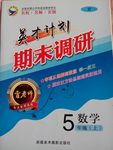题目内容
【题目】We are faced with the problem _________ we should do with so much pollution.
A. what B. why C. that D. That
【答案】A
【解析】试题分析:句意:我们正面临着怎样处理如此多的污染问题。这里是一个同位语从句,根据从句中do with可知这里需要一个宾语,且表示物,那么what最佳。

练习册系列答案
 名师点拨卷系列答案
名师点拨卷系列答案 英才计划期末调研系列答案
英才计划期末调研系列答案
相关题目